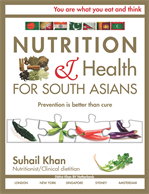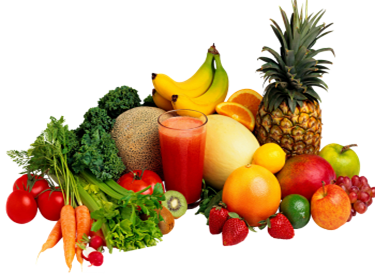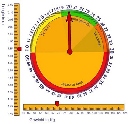
NUTRITION AND HEALTH FOR SOUTH ASIANS
INTRODUCTION
The quality of life begins with the quality of the foods that sustain it. Health includes not merely
the absence of disease. Healthy living is a matter of conscious choice. Our diet determines in
large part how we look, how we work and how we feel. Nutrition is the single most important
component of preventive health care for diet has been associated with obesity, high bleed
pressure, heart disease, diabetes mellitus, cancer, and liver cirrhosis. Optimum nutrition is the
level of intake that should promote the highest level of health. Nutrition is a key to a sustainable
living. Our diet affects our personality and our quality of life. Food can also determine whether
we age prematurely or we have a lifetime vital health. The nutrients will, unlike drugs, unfold
their positive and beneficial effects gradually and their functionality greatly assist when healthy
and balanced diet is consumed. Various studies have shown that many chronic diseases may be
the result of poisoning of the metabolic processes in the body. By consuming different pollutants
through food, water and by breathing contaminated air can create an accumulation of
hazardous substances in tissues and internal organs. The composition of the diet should take
particular care to the quality and freshness of the food.
This book was written to encourage you to explore different aspects of food and to enable you
to take maximum control and responsibility for your own health. It is meant to provide basic
knowledge on various nutritional issues currently facing South Asians. The ability to cope with
stress is directly related to our daily food. Food appears to have a direct influence on the brain
cells, and the functioning of the brains. Albert Schweitzer says,” the greatest discovery of any
generation is that human beings can alter their lives by altering the attitudes of their minds”.
While we would like to think that all people are created equal, we are not, at least when it
comes to health. Each of us has a unique genetic and cultural heritage that makes South Asians
more susceptible to certain diseases and medical conditions. While we can thank our parents for
our individual genetic inheritance, as South Asians, we share not only a common history, but
some common health traits as well. The health problems which many South Asians are facing,
are overweight (obesity), high blood pressure, high cholesterol, diabetes, kidney disorders,
gastrointestinal tract disorders, and heart disease. From various studies have shown that type 2
diabetes mellitus among South Asians, native Americans, and Mexicans 8-10 times more common
than among the other nations. Possible causes include genetic predisposition, dietary patterns,
food & nutritional habits, climate and less exercise. The increasing prevalence of chronic
metabolic disorders at an increasingly younger age is particularly disturbing because of the co-
morbidity in the longer term. Diabetes is one of the lifestyle diseases that are directly related to
nutrition and life style. An epidemiological increase of type 2 diabetes mellitus threatens public
health in wealthy countries. In 2000 the number of people with diabetes mellitus worldwide was
177 million, in 1985 there were only 30 million. This number 2025 might have risen to 400 million.
Netherlands currently has over 1 million diabetes patients. The increase of diabetics will mainly
be seen in Western countries due to increasing obesity, the increase of aging, lack of exercise
and improper diet. In short: you are what you eat, drink & think.
I have divided this book into two parts, namely nutrition in health and nutrition in disease. The
first part deals mainly with general information on nutrition and health, specific eating habits and
daily food of most South Asians. The second part deals with some aspects of the metabolic
syndrome. The metabolic syndrome is actually a collective name of various diseases, such as
obesity, hypertension, hypercholesterolemia, diabetes mellitus, kidney disease and heart
disease. I hope that the inherent superficiality of this book is the touchstone of criticism from
the scientific community will be able to endure.
In Ayurveda, the importance of a healthy nutrition has been recognized for thousands of years.
Good eating habits improve both the health on one hand and slow the aging process on the
other. Enjoyment and happiness in life begins with optimal health. Research into brain function
reveals evidence that the emotions of love, faith, joy, fear, sadness, and even our sense of
purpose in life are not merely attitudes created through the mind’s thought processes. They are
actually produced and reinforced by biochemical activity within the brain, which in turn is
affected by nutrients supplied by the food we eat. Raw foods contain nutrients needed for
proper brain function. Cooking and especially processing of foods destroy nutrients needed to
avoid anxiety, mood swings, depression, and many other mental and psychological disorders.
Until we know more about the connections between food and our emotions. The purest, safest,
most animal- and plant-friendly source of nutrition is raw foods.
It is my intention with this book to help to take control and optimize your health. I present in
this book the knowledge I have learned from years of scientific study & research as well as the
knowledge I have learned from years of treating thousands of patients with more than 46
different nationalities. I see this book as an opportunity to introduce you to many new ideas
that you may not have had an opportunity to think about. This book will teach you about the
important relationship between your daily food and your health.
Herophilus says,” When health is absent, wisdom cannot reveal itself, art cannot manifest,
strength cannot fight, wealth becomes useless, and intelligence cannot be applied”.
Suhail A. Khan
Nutritionist/Clinical Dietitian
Prevention is better than cure
An informative book on the South
Asian’s (India, Pakistan, Bangladesh,
Bhutan, Sri Lanka, Maldives, Nepal) daily
food and the most common disorders
such as food allergies, obesity,
hypertension, diabetes mellitus,
hypercholesterolemia, kidney disorders
and cardiovascular disease.
Suhail Khan
Dietician/Nutrician

Copyright © 2013 All rights reserved. Dietician/Nutritionist Khan - Sitemap
WebDen Website Design en Hosting - Website ontwerp door: www.designer-dragonfly.nl
WebDen Website Design en Hosting - Website ontwerp door: www.designer-dragonfly.nl


Hier kunt u uw BMI
berekenen.
berekenen.







































